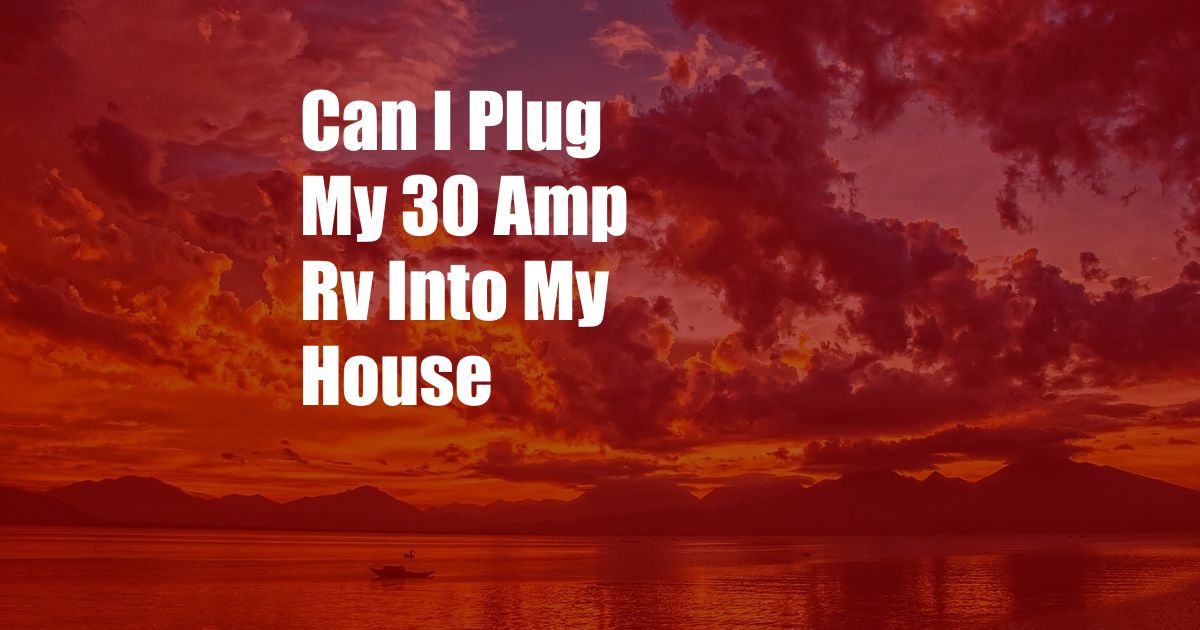
Can I Plug My 30 Amp RV Into My House?
When RV camping, having access to electricity is essential for powering appliances, charging devices, and staying comfortable. If you’re camping near home, you may wonder if it’s possible to plug your RV into your house instead of relying on campground hookups.
The short answer is: yes, you can plug a 30-amp RV into your house, but there are a few things you need to consider first. In this comprehensive guide, we’ll delve into the technical aspects, safety precautions, and expert advice to help you make an informed decision.
Understanding Amperage and Your Home’s Electrical System
Amperage measures the flow of electricity. A 30-amp RV requires a power source that can deliver 30 amps of current. Most homes in the United States have a 120-volt electrical system with a maximum amperage of 15 or 20 amps per circuit.
If you try to plug a 30-amp RV into a 15-amp or 20-amp circuit, you’ll likely blow a fuse or trip a breaker. To avoid this, you’ll need to determine if your home’s electrical system can handle the additional load.
Checking Your Home’s Electrical Capacity
To assess your home’s electrical capacity, locate your main electrical panel. Look for the main breaker, which is usually located at the top of the panel. The amperage of your main breaker indicates the maximum amount of current your home’s electrical system can handle.
If your main breaker is rated for 100 amps or more, you should have enough capacity to power a 30-amp RV. However, if your main breaker is rated for less than 100 amps, you may need to upgrade your electrical system to accommodate the increased load.
Using a Dedicated Circuit
It is strongly recommended to use a dedicated circuit for your RV hookup. This means running a separate electrical line from your main panel to an outdoor outlet specifically designed for RV use.
A dedicated circuit ensures that your RV has its own power source and doesn’t share a circuit with other appliances in your home. This reduces the risk of overloading the circuit and tripping a breaker.
Safety Precautions
When connecting your RV to your house, it is crucial to follow all safety precautions. Always use a properly grounded outlet and ensure that your RV’s electrical system is in good working order.
Check for any loose wires or damaged components before plugging in. Also, consider using a surge protector to prevent voltage fluctuations from damaging your RV’s appliances.
Tips and Expert Advice
Here are some additional tips and expert advice for safely connecting your RV to your house:
- Use a heavy-duty extension cord rated for at least 30 amps.
- Keep the extension cord as short as possible to minimize voltage drop.
- Avoid running the extension cord through doors or windows.
- Unplug the RV when it’s not in use to prevent unnecessary power consumption.
- Contact a licensed electrician if you’re unsure about any aspect of the electrical connection.
FAQ
Here are some frequently asked questions about plugging an RV into a house:
Q: Can I plug a 50-amp RV into my house?
A: No, most homes cannot handle the high amperage requirements of a 50-amp RV. You would need to upgrade your electrical system to support the increased load.
Q: What happens if I overload my home’s electrical system?
A: Overloading your electrical system can cause a fuse to blow or a breaker to trip, cutting off power to your home. In severe cases, it can also lead to an electrical fire.
Q: How long can I safely plug my RV into my house?
A: It depends on the amperage of your home’s electrical system and the number of devices you’re running. However, it’s generally not recommended to plug your RV into your house for extended periods.
Conclusion
Plugging a 30-amp RV into your house is possible with proper planning and safety precautions. By following the guidelines outlined in this article, you can safely power your RV without overloading your home’s electrical system.
Remember to consult an electrician if you have any doubts or require professional assistance. With a dedicated circuit, appropriate amperage, and adherence to safety measures, you can enjoy the convenience of powering your RV from the comfort of your own home.